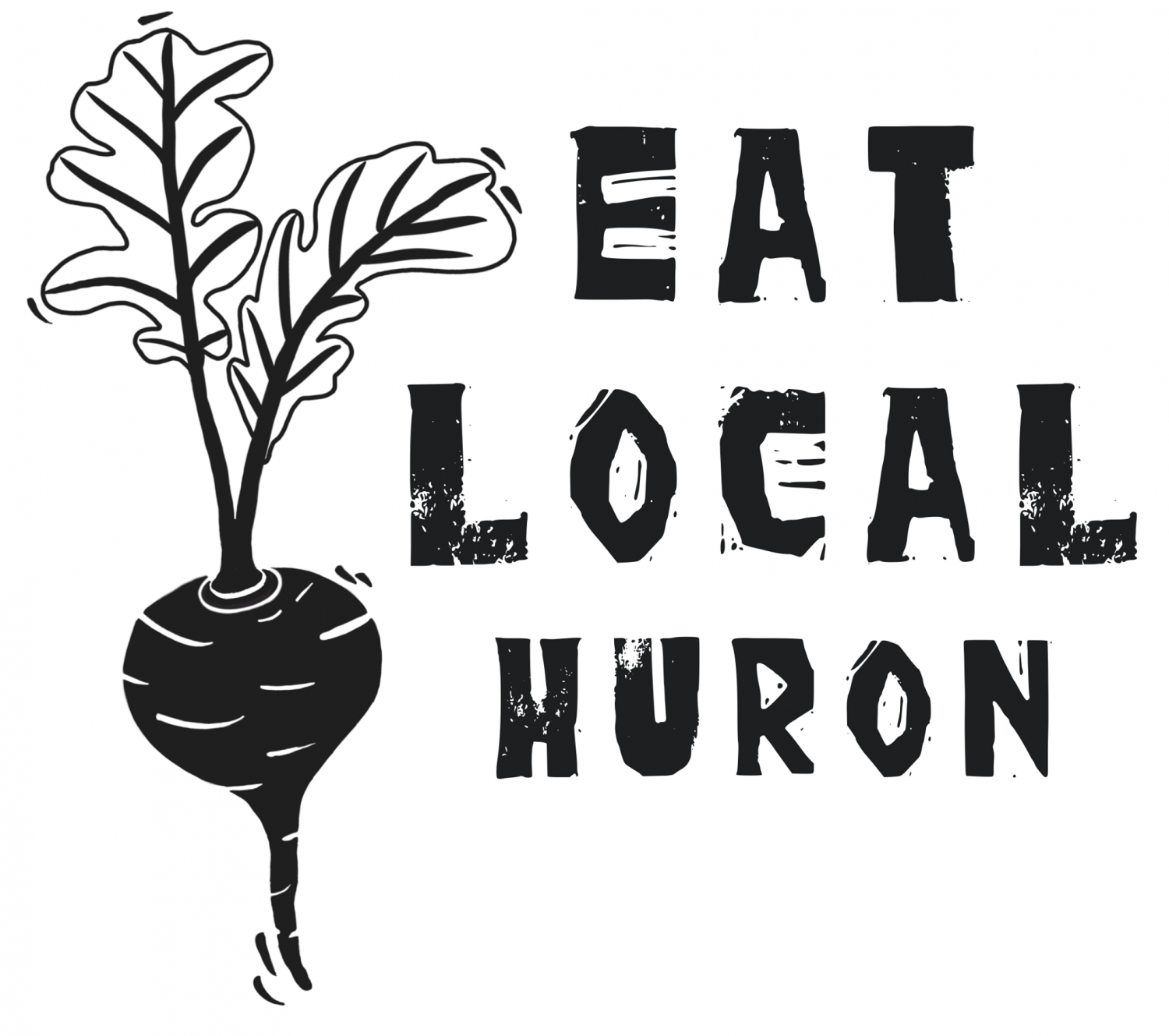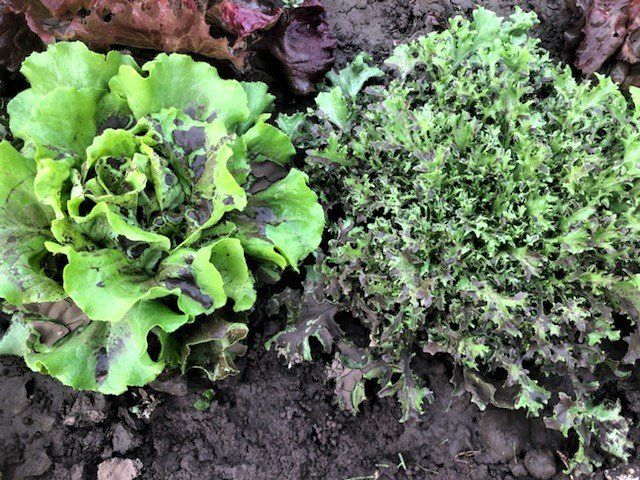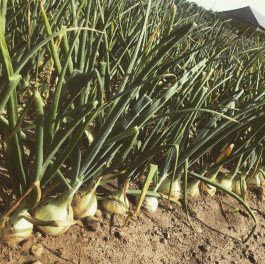September 16, 2021
The Lettuce Rejoice!
Firmly Rooted Farm's Newsletter for their Veggie Loving Farm-ily

On the Farm: Ode to Onions
Hello again my veggie loving friends,
Something about the fall makes me want to cook more. I recently preserved peaches and tomato sauce for the winter and harvested some wild grapes to make wine and jelly. Soon I will be in full-out soup mode, freezing extras for when I don’t have the time or energy to cook. Tis the season. The great bounty of fall harvest and the impending arrival of winter reignites a fervour for food we always hold within us, a passion that has inspired many civilizations to hold harvest celebrations in the fall.
I once worked in a kitchen as a prep cook. This stint didn’t last long, but not for lack of love, I simply moved on to other things. However, the greatest impact this experience had on me was how it influenced my relationship with onions. The sous chef would not accept anything other than perfectly brunoise onions. Do you know how small you must dice onions to achieve brunoise? And to do this perfectly and efficiently is no easy feat. It certainly does allow the onions to deepen a dish’s flavour without taking over the show. I don’t brunoise at home, usually, unless I feel like torturing myself for fun. I will say that the French certainly have a flair for detail.
Given that we’ve recently harvested our storage onions and began offering them to the Farm Share, I want to focus this week’s newsletter on the humble onion. Allium cepa, or the bulb/common onion, is a staple in nearly all diets around the world. An unsung hero in most cooked dishes. One of the most popular seasonings, following perhaps salt, butter, and pepper. But what mysteries does this odorous vegetable hold? What can we find if we peel back its layers, slice into its juicy history, tearfully brunoise its crisp flesh?
The birthplace of onion domestication seems unknown for certain, but current evidence suggests domestication began in the Middle East. However, even this has been contested. A major reason why the beginnings of onion domestication are such a mystery is that the exact wild ancestor to the common onion is unidentified and may even be extinct in the wild. Many cultivated crops can be traced back to their origin of domestication through prehistoric remains. However, the lowly onion does not lend itself well to such long-term preservation (we’re talking thousands of years of course) and therefore, researchers rely on written records, carvings, and paintings to detail the entanglement of humans and onions. These historical records become less reliable and more fragmented the further back you go, but they do prove some things. Allium cepa is one of the oldest cultivated vegetables, with records dating back over 4000 years. The earliest records originated in Egypt, with onions appearing in carvings on walls and tombs, indicating an important presence in the diet of the ancient Egyptians. Mesopotamia, India, and both the Greek and Roman Empires all have ancient accounts of the consumption and cultivation of onions. The onion made its way across Europe, becoming a widespread crop in the Middle Ages. It was among the first cultivated crops to be taken to the Americas and became an established crop in what became the northern USA by the 17th century. The common onion is well travelled.
Although cultivation may have occurred over 4000 years ago, it's presumed by food historians that humans have been consuming wild onions for far longer, likely predating the written word. Throughout their history, they have been revered as more than simply a food staple. Perhaps an excellent example of the emotional connection humans have with our food, the Egyptians saw eternal life in the anatomy of the onion because of its circle-within-a-circle structure. King Ramses IV died in 1160 B.C.E and was entombed with onions in his eye sockets. As early as the 6th century, the onion was mentioned in Indian texts as a helpful diuretic, good for digestion, as well as the heart, the eyes, and the joints. In ancient Greece, onions were used to strengthen athletes before the Olympics. Athletes would consume pounds of onions, drink onion juice, and rub onions on their bodies. I’m not sure about the physiological impacts of this practice but am sure everyone ran as fast as they could simply to get away from the smell of themselves. The Romans believed onions cured vision, induced sleep, and healed dysentery. The Europeans of the Middle Ages used onions for headaches, snakebites, and hair loss, as well as offered onions as gifts and rent payments. In North America, several strains of wild onion grew and still do (none are the ancient ancestor of Allium cepa) and were used by indigenous populations for cooking, as well as poultices, ingredients in dyes, and as toys.
The common onion and all its cultivars are the most economically important allium crop in the world (other alliums include garlic and leeks). It is the second in value behind tomatoes in terms of cultivated vegetable crops worldwide. It stores for long periods of time, offers great nutritional value, and holds a great deal of water, meaning it’s valuable in fending off thirst and malnutrition. Humans have grown alongside the onion for thousands of years. I cannot understate how integral it has become as a food staple in our diets. From the foundation of a soup to the foundation of civilizations, it’s a complicated vegetable, with a complicated history, shrouded in mysticism and questions. Where did the onion come from, and where will it take us from here?
Kitchen Corner

I’ve decided to share with you a detailed recipe for caramelizing onions. There are countless recipes out there that claim you can caramelize onions in a matter of minutes. It seems like some strange conspiracy on part of all recipe blogs and cookbooks because in my experience, caramelizing onions is a slow and patient process that takes time. Low heat is key, as well as proper technique. The full recipe can be found here, which includes helpful videos as demonstrations. Caramelized onions are necessary for French Onion Soup, delicious in dips and on burgers, a wonderful addition to grilled cheese, or just as an accompaniment for any of your main dishes. You can also enjoy onions roasted with your favourite veggies or added raw to a salad, there are not many dishes that cannot be enhanced with onions.
Kitchen Clean-Up
It seems like Mother Nature is getting in a few last summer storms before shifting to fall. We’ve suffered a little hail damage on the soft crops like lettuce and spinach, but other than that have faired quite well. If your greens seem a little holier than usual, consider them the blessed ones. Also, despite best efforts, there is a gap between our carrot plantings, and we had poor germination in our fall carrots. We will offer carrots over the coming weeks, but in a smaller number than usual in hopes of letting the next plantings reach the ideal size. Thanks for your understanding!
Additionally, if you are a Bayfield CSA member, your pick-up will continue to be at Clan Gregor Square in the same setup as before the market began. I apologize for the change of plans, and any confusion this may cause! Also, a reminder to Completely Rooted CSA pick-up folks, the pick-up is 1:30-4:00. We have been delivering earlier than this due to the Bayfield market happening, but our delivery time will be pushed back to roughly 1:30 from now on.
That’s all for now folks, happy eating until next time!
Farmer Erika




